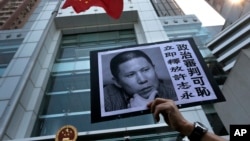A Chinese legal activist who founded a loose network of socially conscious citizens was released from prison Saturday at the end of a four-year sentence, his lawyer said.
Xu Zhiyong helped found the New Citizens Movement, which at the time organized monthly dinners to discuss China’s constitution and other legal issues.
Zhang Qingfang, Xu’s attorney, said he was freed Saturday morning from a prison in Beijing. He said Xu was in good health, but had no further details to share.
Disrupting order
It was not immediately clear if despite his release Xu’s movement continued to be restricted. Authorities commonly place activists seen as politically sensitive under some form of house arrest to prevent them from speaking publicly. Xu could not be reached on his cellphone.
Xu was convicted in January 2014 of disrupting order in public places, a vaguely defined charge that activists say has been used to muzzle government critics.
Xu’s arrest in 2013 and imprisonment was seen as dealing a major blow to the group’s efforts to develop a socially conscious public aware of their rights as citizens to call for greater official accountability in anything from corruption to equal rights to education.
Xu and his supporters purposely kept the movement unstructured so as not to challenge the party’s zero intolerance on organized movements. They downplayed any political appeals and championed causes that were in line with the party’s own stated goals.
Others arrested
Still, Xu’s fledgling campaign became a target after it inspired people across the country to gather for dinner parties to discuss social issues and occasionally to unfurl banners in public places in small rallies.
Several of his supporters had also been sentenced to prison in 2014 in prosecutions that raised concerns among Western governments and human rights groups. American and European diplomats made unsuccessful attempts to attend the trials.
The sentences, decried by other dissidents as excessively heavy, reflect the increasingly hard line that China’s Communist Party has taken against political dissent, no matter how peacefully expressed or loosely organized. Party leaders have been wary of any independent social force with the potential to threaten the party’s rule by mobilizing groups of people.




